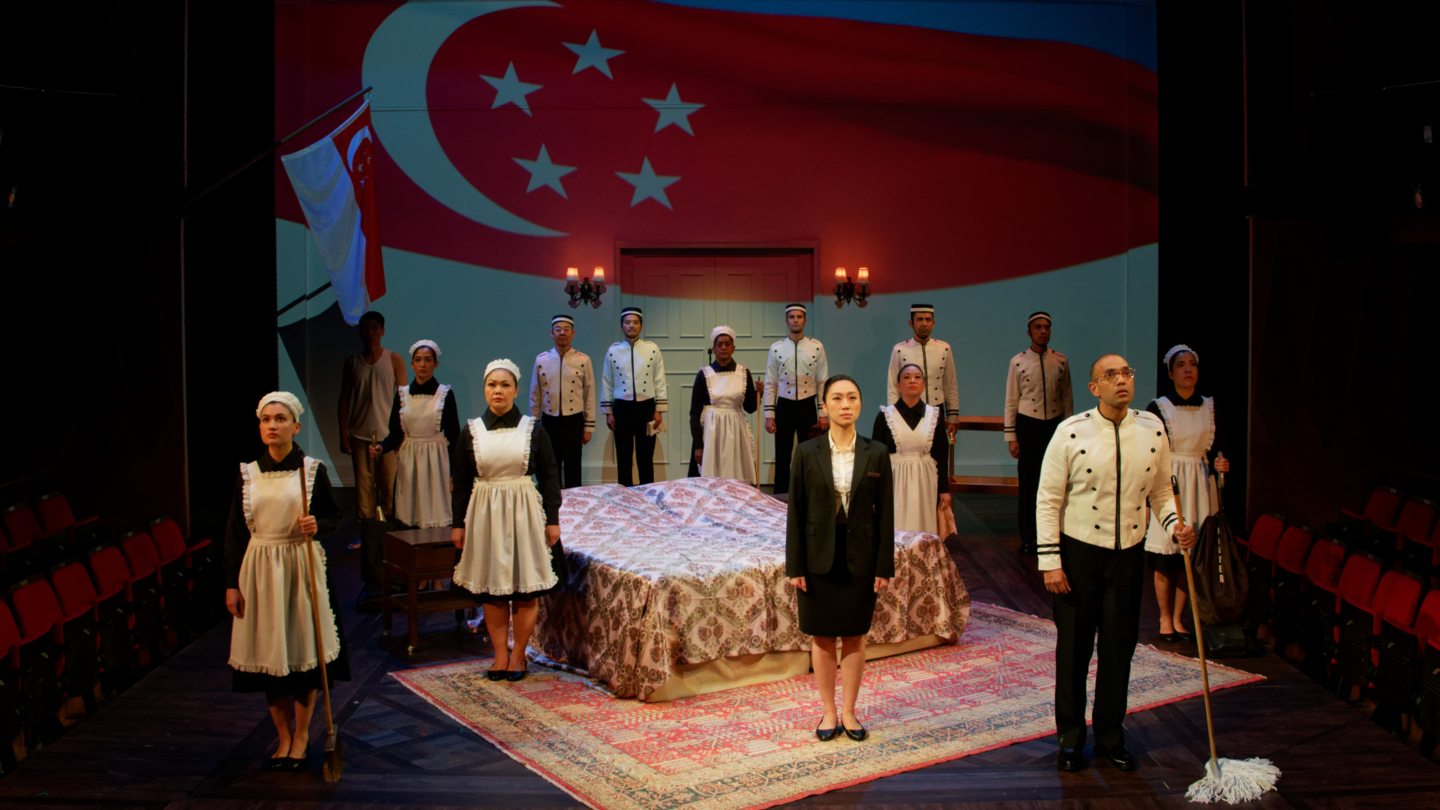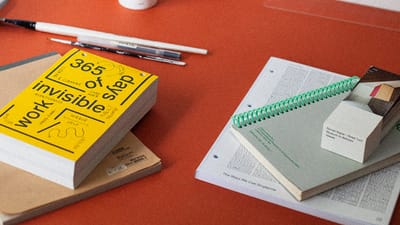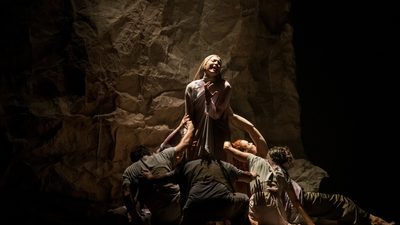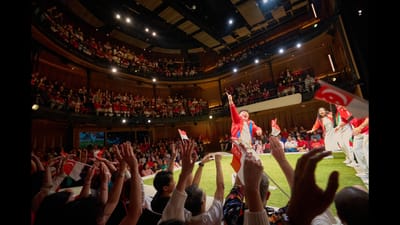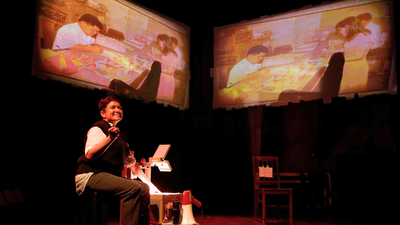Something happens when you travel to a place for the third time. The first time may be about making the foreign familiar, about setting up the infrastructure of your stay. You need bureaucratic legibility—whether that’s your visa, your bank accounts, your commuter routes. Everything takes you by surprise; everything takes you a little longer. Whether you’re a business traveller or a new immigrant, the first time is about establishing a relationship with a site so that you might ease your return to it, consciously or not.
The second time is when the preemptive pleasures kick in, and you recognise the little invisible signposts you’ve left that only you can touch. Maybe it’s hotel suites and aeroplane seats from the last time, or the returning muscle memory as you pick your way through a train station. Or your usual order at that cafe round the corner—all the rituals and routines we create to give us the illusion that a temporary space is a permanent home.
But the third time—the third time, I think, is when something shifts. What draws you to a place, again and again? What makes you a “regular”? Neither the cafe nor the hotel room are your homes, but both are transient spaces shaped by architectures of hospitality and hosting that, in turn, allow you to form a more intimate relationship between your self and a site. The barista who remembers your order and has it ready the moment you step through the door; the cashier at the train station snack bar who knows what time you leave for work and when you get home. To be a good host is to remember your guest’s preferences and to be attentive to their particularities. We are hosted by a fleet of often invisible people with whom repeated contact becomes startlingly intimate as they preempt our needs and adjust to our rhythms.
This contract of hospitality is crucial to how we extend our social encounters into durable kinships. I encountered Wild Rice’s blockbuster play “Hotel” for the third time last June, and to be a regular guest in its theatre stalls has meant establishing not just a durable relationship with the popular theatre company—but also a durable kinship with our Singaporean history, as hosted by “Hotel”. For five hours, this sprawling, stunning production held all of us in a single hotel room. We sped through the course of a century, bearing witness to the long exposure of Singaporean identity-formation the way a photograph might smudge with motion even if its backdrop remains the same. The room’s wallpaper, furniture and carpeting transformed with each decade’s aesthetic appetites—as did Singapore’s micro- and macro-histories as we fast-forwarded through the country’s costume changes: former crown colony, peninsular port city, occupied territory, cultural hub and, eventually, the gleaming metropolis nation-state we recognise today.
Fourteen actors speaking nine languages played a staggering 66 characters between 1915 and 2015, and the 25-minute vignettes (one for every decade) written by Alfian Sa’at and Marcia Vanderstraaten accumulate to offer us a collage of how power dynamics and social hierarchies can shift in a single generation, or more imperceptibly over a longer sweep of time. Every scene pivots around a specific historical incident or zeitgeist. We begin with the 1915 Sepoy Mutiny, but subsequent scenes cite broader socio-political movements, such as the impending second world war (1935), the golden age of Malay film (1955), Singapore’s extended anti-yellow culture campaign (1975), and post-9/11 Islamophobic paranoia (2005).
Watching “Hotel”, I wondered, what makes port cities and trading hubs such as Singapore such consummate hosts? As a “catch-up port”, Singapore is expected to resolve the delays that ships face at other clogged waystations. As a country, we understand, perhaps subliminally, that the essence of transshipment and constant renewal necessitates quick forgiveness, the turning over of chapters. This also translates into other, more uneasy, postcolonial amnesias; Singapore has been quick to welcome back former imperial powers such as the British and Japanese, more so than other nation-states, and “Hotel” captures this well—particularly in a scene from 1985 where a younger generation of Singaporeans only recognises Japan for its walkmans, rather that its war crimes.
But “Hotel” isn’t just about political histories. The same actors play older versions of themselves or descendants of characters in previous scenes, and the way their bodies host these multitudes of characters are vital to the life force that travels through the play. Personal histories coalesce into national and regional ones, whose shapes we recognise, but here told from different points of view. While the broader mechanics of history move around and outside the hotel room, we are invited to eavesdrop on marital strife, giggle over familiar familial miscommunications, have our hearts broken by parting, but also mended by the promise of reconciliation decades later.
Personal stories are inflected by the heirlooms that travel with their inheritors across generations. Our bodies and the objects we encounter become hospitable to a variety of histories, inasmuch as “the study of deep history depends on offering the hand of hospitality to strange and unfamiliar objects...only in this way could handaxes cease to be stones and become proxies for remote times and ancestors.” A necklace, given out of guilt in 1915, embodies an act of selfless generosity in 1995. A walkman carries the recording of a wartime love lost in 1945, and acts as a kind of memory grenade in 1985 when it is played back, 40 years later. With every scene I found myself gripping the arms of my seat even though I knew what was to come, sometimes mouthing lines I recognised, other times turning to take in the response of those watching the play for the first time: leaning forward in their seats, mouths open, doubled over with laughter, wiping the tears from their eyes.
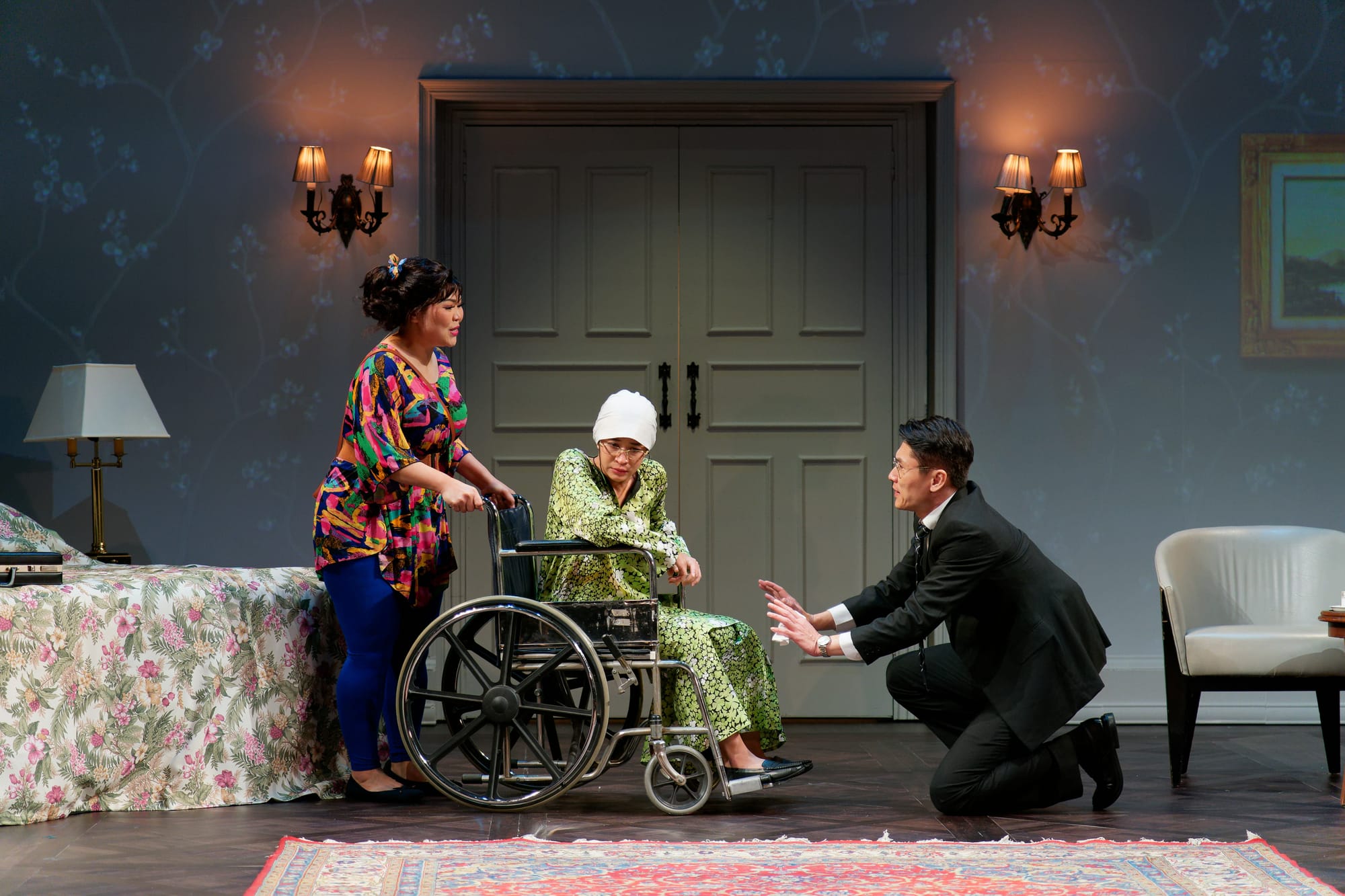
There was a point in this year’s performance where I wondered if I had written all that I had desired to write about this show. The cast members—the majority of whom have been with the show since its inception in 2015—had become so practised and precise in their choreography and embodiment of their characters; I still remember the flubbed lines and uneven accent work of the play’s first incarnation that everyone excused because we could all see the shape of something greater and more astonishing pushing through the seams of each scene. Actors Siti Khalijah Zainal, Jo Kukathas, Ghafir Akbar, Dwayne Lau, Yap Yi Kai, Moo Siew Keh, Pam Oei and Brendon Fernandez all retained their characters over the past eight years; Ivan Heng joined the ensemble in 2016; and Rebecca Ashley Dass, Munah Bagharib, Koji Miyoshi, Oon Shu An and André Jewson were first-timers to the 2023 “Hotel” suite. We got some truly virtuosic turns by performers such as Oei, who had to land the precision of comedic farce as a rich tai-tai possessed by a spirit in one scene—and then transform into a poker-faced, racist matriarch, a foil for the rest of the cast of an interracial wedding channelling the slapstick chaos of an “Under One Roof” episode. Then there’s Ghafir, turning on the charisma as musical genius P Ramlee in one scene, and the pathos of a well-heeled businessman subject to racial profiling and police brutality in another.
The show made its debut in a politically potent year—the Singapore Jubilee celebrations of 2015, also the year of Lee Kuan Yew’s death. I wondered if the show would have an afterlife after this. The Singapore state had sculpted a very particular affective narrative about its history; as philosopher Jan Slaby and political scientist Christian von Scheve have pointed out, the use of affect and emotion is often among the “strategies of governance employed by state actors to secure allegiance and elicit conformity among its constituents.” “Hotel” was very much part of a constellation of artistic and creative work produced in the same year to both bolster and contest the emotional sway the state held over a certain version of Singaporean history; one might include in this list Sonny Liew’s labour of love to Singapore’s erased leftist political histories, the graphic novel The Art of Charlie Chan Hock Chye, but also the former Singapore Repertory Theatre’s hagiographic tribute to Lee Kuan Yew, “The LKY Musical”.
But we were watching “Hotel” in a new world. In the years since the play’s premiere, we have witnessed a profound shift in the ways in which Singaporeans connect with gender violence (#MeToo); sexuality (the repeal of S377A); race (the furore around brownface and the emergence of local platforms such as Minority Voices, and advocacy by influencers such as Preeti and Subhas Nair); and the death penalty (through work by activists such as Kirsten Han and the Transformative Justice Collective). The first time I watched the scene from 1915, where a colonialist British couple (André Jewson and Oon Shu An) debate during their honeymoon if they should watch a public execution of Sepoy mutineers, the point of reference we shared was the 2013 Little India riot and the faultlines and heightened policing that resulted from this event. Ten years later, the fallout of the riot has extended into broader conversations around the lack of migrant worker rights, their record lockdown during the Covid-19 pandemic, and workplace deaths. There is accretive sedimentation here, from some of the first generations of South Asian migrants to arrive in Singapore, to our deeper understanding of the current dynamic between officials and migrants—on top of contemporary conversations around the inhumanity of the death penalty and if any crime is ever commensurate with death.
Later on, a delightful scene from 1975 largely constitutes a side-splitting, drug-fuelled romp through a trans sex worker’s personal history—but, more seriously, her decisions around sex reassignment surgery. Bridget’s (Brendon Fernandez) autonomy over the unabashed queerness of her body fits beautifully into the still-unfurling contemporary understandings of gender fluidity and non-binary identities.
I was struck by how hospitable the structure of “Hotel” is to these changing contexts. Several acts of revisitation take place at the same time: “Hotel’s” initial revisitation of Singapore’s histories in 2015; Wild Rice’s decision to restage the work not once but three times, including once in Australia; and repeat audience members such as myself who are rewatching the work alongside newer guests and fellow travellers through Singapore history. We also watched the work in Wild Rice’s new Funan performance space, a theatre in the round that offers a level of intimacy that the Victoria Theatre and Singapore Airlines Theatre at the LASALLE College of the Arts, both conventional proscenium stages, do not. The performers frequently walked through the audience, and we were often just several feet away from their joys and tears.
When we are hosted by others, we allow ourselves to be positioned and oriented towards what our hosts desire us to see; if the gestures of our hosts are particularly practised, we may overlook or be persuaded to ignore certain things. This is true of “Hotel”, even if Alfian, Vanderstraaten, director Glen Goei and the creative team desire to offer us an alternative and empathetic path through Singaporean history. Does that make “Hotel” an intermediary—or a gatekeeper? The play plays with agency on both an individual and national, even transnational level, to the extent that larger patterns of trade and neo-colonial exploitation are transnational. In a scene from 1955 depicting pioneering film producer Runme Shaw (Ivan Heng) and regional film phenomenon and multi-hyphenate P Ramlee (Ghafir Akbar), we see how the market’s demands shape language, approach and content. Wild Rice is one of the rare theatre companies in Singapore that has access to its own theatre, one that affords it a degree of agency and hospitality—but is simultaneously subject to other kinds of market forces and force majeure, such as a global pandemic or state censorship. As “Hotel” repeats, it is itself becoming a more formalised narrative of a certain perspective of history. The play can’t escape the semiotics of the SG50 frenzy (the heavy-handed marriage and separation metaphors in 1965, for one, as a couple goes through a break-up as anthropomorphic versions of Singapore and Malaysia); other chapters are starting to feel worn at the edges, playing well in 2015 but feeling dated in 2023 (the final scene exploring Singapore as a hub for new immigrants feels a touch xenophobic in parts, even if leavened by humour and parody).
As “Hotel” enters the Singapore theatre canon, we will have to rely on the changing bodies of the subsequent performers who take on the ensemble roles, as well as the permeability of the work to editing, to think about how a play might live anew when hosted by different bodies, contexts and surroundings.
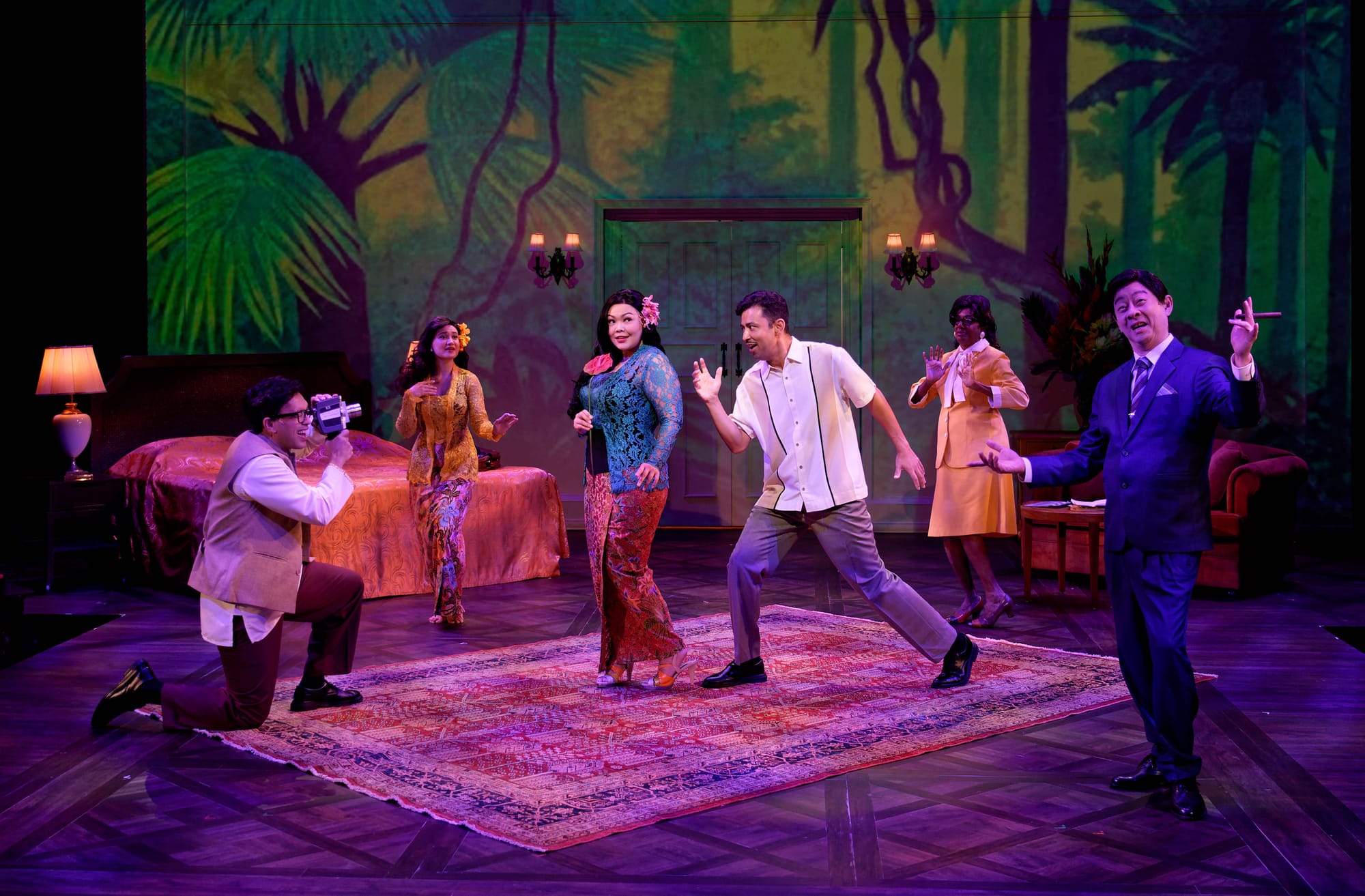
I also often think about the role of the arts critic as part of this ecosystem of hospitality, as an embodied archive accruing experiences of performance over time. It’s a thin line to walk between intermediary and gatekeeper, the way Singapore’s position at the mouth of the Johor river, the maritime entrance to the rest of the peninsula, made it a site for the role of the shahbandar or harbourmaster, who oversaw custom duties and investments by proxy, managed disputes between locals and foreigners, and inked treaties on behalf of faraway rulers and administrators. My intimate and “durable kinship” with Singapore theatre has evolved over the past decade: as I become a theatre “regular” in the theatre, I am positioned by artists and arts groups as much as I am a proxy who positions their work for others.
The South-east Asian archipelago is scored by dense vectors of movement and migration, and its port cities—such as Bangkok, Penang, Singapore and Yangon—have become sites of perpetual transience. We are home to the commuter, the “expatriate”, but also the invisible host of the guest worker, the diasporic and immigrant communities who form the backbone of our service and hospitality industries. When “Hotel” returns to the stage, as I am certain it will, I wonder if it will invite us to pay more attention to these invisibilities. As audience members, we too have a responsibility not to be pelancong, tourists who travel for leisure and tourism, but what the Indonesian sociologist Mochtar Naim theorised as perantau, those who migrate voluntarily in search of new opportunities and the dissemination of cultural knowledge. Unlike the pelancong, the perantau is privy to the backstage labours of arrival and departure, aware of the privilege of mobility and service, and has a responsibility to think about the reciprocal ways in which one might become a host for others, offering insight into the networks of escort, support and reception that can gather around a new arrival.
If we think of ourselves as perantau laying the groundwork for future paths of arrival, then we can see how “Hotel” plays with the unpredictable hospitality of time. Our ancestors, making decisions based on the limited information they had access to at the time, have sent long reverberations into the future we are currently living. What does it mean, “Hotel” asks, to pay attention to the long path of history beyond the span of a single life, or the lifespan of a single polity? The fortunes of sovereign states rise and fall, as do those of the people it claims as its own. The lines of citizenship can change in a day, and the separation of Singapore is cited alongside other violent separations, such as the 1947 Partition of India. I am reminded of futurist Ari Wallach’s Longpath, where he invites us to take a view of life “from 30,000 feet in the sky and 30,000 years into the past and the future”, so that we might be reminded “we are part of something bigger than ourselves, and that while our own time is finite, we need to become the great ancestors our descendants need us to be”. The past may be a foreign country, but the future doesn’t need to be. How might we think of the ways in which we orient, position, arrange, and mobilise ourselves—as hosts for a history that has not yet arrived?
Corrie Tan is Jom’s arts editor. She is also a senior lecturer at the Nanyang Academy of Fine Arts and director of the Asian Dramaturgs’ Network.
If you enjoy Jom’s work, do get a paid subscription today to support independent journalism in Singapore.
This essay was initially published in Jom’s first annual print magazine, which you can purchase here.
Letters in response to this piece can be sent to arts@jom.media. All will be considered for publication on our “Letters to the editor” page.

